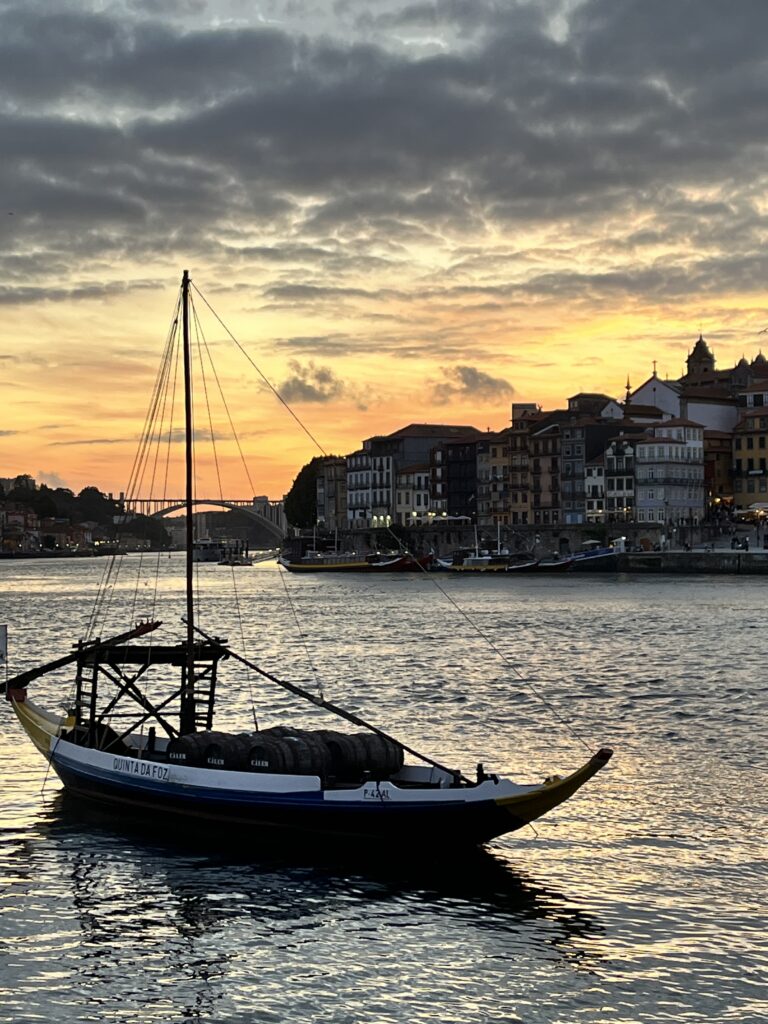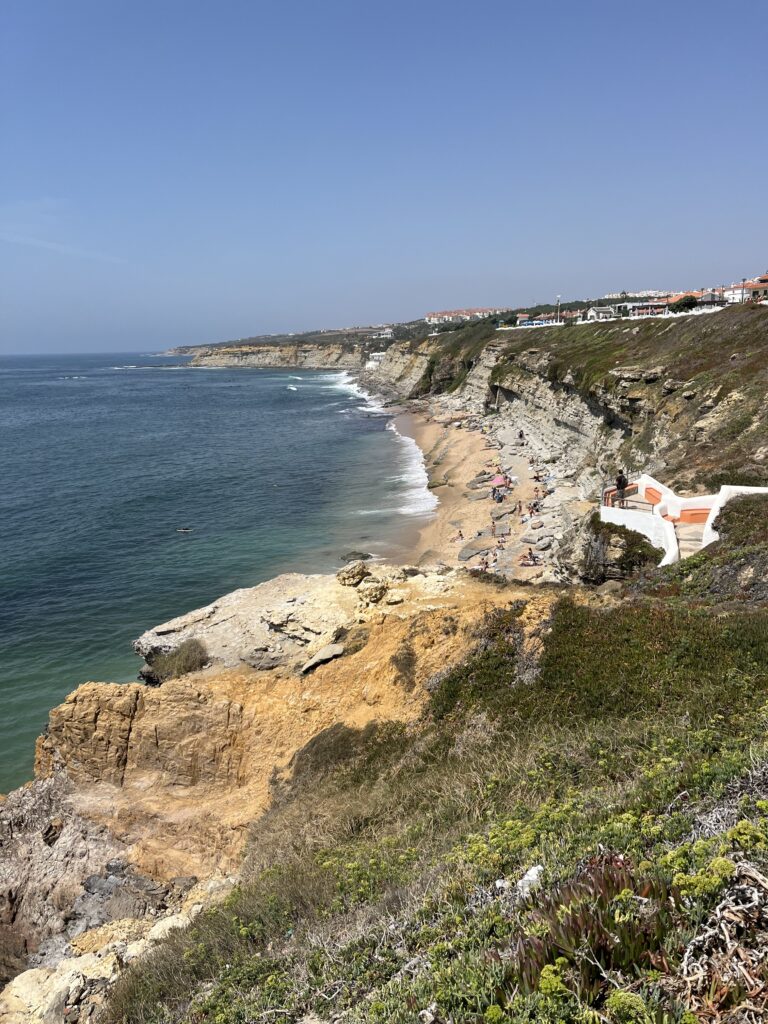So you’re moving to Portugal, congratulations! Portugal is, so far, one of my favorite countries I’ve lived in. I live in Lisbon and it has all the standard great things that a big city can offer, like museums, excellent carless transportation, and great food. On top of that, Lisbon and many Portuguese cities offer great beaches, easy access to both African and European countries, affordable and delicious wines, affordable food, dog-friendly sidewalk cafés, excellent sporting and concerts, and community.
I never grow tired of the architecture, from the churches built many centuries ago to the beautifully tiled past-century buildings. Lisbon has a wonderfully diverse population and is the most intercultural city that I have experienced. My favorite thing about Lisbon are the people who make this old European city feel like a small, friendly village. I also love that there is no reason to own a car in Lisbon with the metro, trains, trams, charming trolleys, buses, funiculars, and lifts. But with such beautiful sidewalks, walking is a pleasure. Lisbon never runs out of ways to stun and surprise.
Portugal is a country that is slightly smaller than the state of Virginia in the US. Despite its size, if you are visiting or moving to Portugal, you will be pleased to know that you can find just about everything you need here. When you cannot find something in Portugal, you should be able to find it online somewhere in the EU, including Amazon Germany or Spain. From Lisbon, Porto, or Faro, it is a quick and affordable flight to many African and European cities, so shopping on vacation is possible with checked baggage.
Scouting Trip to Portugal: What did Lisbon offer?
We took an initial trip to Lisbon to see if it would be a place we might like to live. On our scouting trip, we visited clothing stores, grocers, and pharmacies to check out food and product availability. Lisbon immediately felt like an easy city to be in. A few things that were important to us were a diverse population, a wide variety of food and dining options, recycling, natural health stores, and walkability.

The Move to Portugal: What we Brought
Determining what to pack boils down to knowing what we can and cannot live without during the first months. In our case, the move happened during summer and during a pandemic, and we knew we wouldn’t be able to travel back to the US for another 6-15 months. Fitting a year’s worth of needs, including two seasons, into seven bags was not easy. In the end, we prioritized our technical gear and tools, including cabling, clothing, shoes, pet supplies, and health products, opting not to bring cold-weather gear because it took up too much physical space in our bags. Let me tell you, the first winter was especially cold, and I never did find a jacket that I liked that was warm enough. I should’ve left much of the hair and skin products behind and brought one good coat for each of us! All told, four of us brought approximately 330 pounds of stuff in seven 50-lb (22.5 kg) bags plus carry-ons, a dog carriage, and two dogs in carriers.
Here’s what we brought on our first move trip.
- Computer gear: microphones, mice, mobiles, headphones, Wacom tablet, portable printer, travel speaker, hard drives
- Summer, comfort, workout, and work clothes
- Nearly all of our shoes because we have larger feet and prefer minimal shoes
- Art supplies (pens, pencils, paint brushes)
- Tools
- USB cords, extension cords with universal plugs, cables, travel plug adapters
- A few stainless steel water bottles
- Health products like medicines, green drink powders, vitamins, several boxes of fluoride-free toothpaste, and reusable menstrual pads and cups.
- Face and skincare products, hair products, perfume, and make-up
- Two of our preferred pillows and one small blanket
- Some kitchen tools (wine key, lemon squeezer)
- Sonicare toothbrushes
- Portable Waterpik flossers
- Baggu grocery totes
- Beard trimmer and electric shavers
- Harry’s razor and enough blades for 1 year
- Portable chargers
- Stainless steel coffee press
- Textbooks for classes
- Violin
- Laundry detergent (3-month’s worth)
- Skateboard and Longboard
- Pet snacks, dog food, pee pads, bedding, and a dog cart
- Kishu Binchotan Charcoal sticks for water
Can you find everything you need in Portugal?
Yes, pretty much. We haven’t had a hard time finding anything, including electronics, gluten-free foods, low-chemical household products, fluoride-free toothpaste, aluminum-free deodorant, coconut flour, hot sauce, and specific brands we might prefer. Prices can, at times, be more expensive in the EU if we are looking for non-EU products (due to import fees), but at least 95% of the time, we can find what we need. The only issue so far has been finding one prescription medicine in Portugal; however, Metropolitan Pharmacy in Germany ships it. Apple products and tech gear are more expensive in Portugal. Other EU countries have better pricing on certain things like Apple products.

Many items we could have left behind, but there are some things we’re happy we brought with us.
- Musical instruments, strings, and music books.
- Apple devices.
- Shoes, due to sizing and type.
- Medications. It’s a good idea to bring several months’ worth of medication. Most medicine is available in Portugal; however, it comes in blister packs. You won’t find bottles of 500 tablets or even 50 tablets of anything here. There is no Benadryl, melatonin, Neosporin, hormone creams, or certain adaptogens and vitamins.
- Our dogs’ stuffable bed and their dog cart. Dogs need a sense of stability and comfort to adapt to change and new surroundings. These two items were very comforting to our dogs.
- Bringing as many clothes and items as we could manage for our teens made the transition easier for them.
- Small items not sold here: Harry’s razor blades, Baggu bags, and some books in English.
- Longboard (needed oversized baggage).
Supply Runs
Visiting the US or other countries is a great time to pick up supplies that we can’t easily find in Portugal. In the US, we visit great thrift stores and get a whole new wardrobe for the year! We also bring more of our items back to Portugal and restock our medicine bag and pantry. Carrying an extra foldable bag or two allows us to take advantage of the resources in the countries we visit. Here’s a partial list of items that we might look for on our travels that are difficult for us to find in Portugal.
- Used clothing and accessories. Many of the thrift stores in Lisbon are not great and they are overpriced. Humana is okay, but the selection is meh.
- Good pillows are weirdly expensive here, ~80 euros++.
- Harry’s razor refills from the US. (Available from the UK)
- Clothing from stores that aren’t in the EU like Old Navy and Athleta
- Sportswear or equipment like Lululemon or Burton
- Candy: Junior Mints, Justins, Swedish Fish, Sweet tarts, red hots, Mike & Ikes, butterscotch, laffy taffy, milk duds, . Bring extra candy to share with others.
- Pet treats. A plus, treats help occupy excited dogs while you unpack. Even pets love a present.
- Specialty or unusual food items like:
- Cornbread mix
- Ranch dressing powder
- Cheez Its and Goldfish crackers
- Velveta (not me, but I hear people desire it or gift it)
- Pumpkin pie spice
- Louisiana and Mexican specialty hot sauces or spices
- Pecans are findable, but not everywhere.
- Graham crackers for Smores! Truly American, bring that when you visit the U.S.
- Sour cream and onion Lays chips
- Anything from Trader Joe’s
- Dehydrated hummus and dehydrated soup (this is just my thing)
- Chocolate (like Tony’s from Amsterdam)
- Rootbeer (also truly American)
- Good BBQ sauce
- Unusual Oreos flavors or unusual cereals
- Sunflower Butter
- Unique liquor
- Bagels (if possible)
Getting help in Portugal: Moving Teams
Navigating the bureaucracy of any new country can be confusing, especially in a different language, but our move to Portugal was one of our easiest international moves yet. Our move happened during a pandemic, so having help was even more useful to us.
The first item of residency to obtain is the NIF (Número de Identificação Fiscal or Número de Contribuinte). The Fiscal Number or ‘Contribuinte’ is your tax identification number, and it’s a fairly straightforward task to obtain a NIF. The next important task will be acquiring a residency card through AIMA (Agência para a Integração, Migrações e Asilo). These items are subject to change so definitely check the websites to see current requirements. To qualify for residency, it is important to have a lease that is valid for one year. The NHR scheme (Non-Habitual Resident Status) that was in place before 2024 granted expatriates/immigrants in Portugal a 20% tax rate or a total exemption on the taxation of income for a period of 10 years. The NHR scheme is a product that goes through regular revisions so it is important to look into the latest requirements for application.
It is highly recommended to have a translator help through the NIF, Residency, and NHR processes. Though it is possible to accomplish these tasks without outside help, employing a native speaker can make things easier for everyone involved.

Opening a Bank Account
Opening a bank account and obtaining Portuguese credit cards should be pretty straightforward and relatively simple for a foreigner to manage on their own. Still, it is best to never have high expectations. This is not because the services or operations are poor, but rather because the foreigner will bring with them a different understanding from their home country about how these processes should go. So, try as best as you can to leave your biases at the door.
Be prepared to encounter poor customer service if you are American. Customer service is an invention by the U.S. and the U.K. and it didn’t really take hold as a concept rest of the world, and though it took me a few years to get to this place, I think the rest of the word is right.
Be prepared to encounter racism.
Be prepared for bank representatives to try to sell you various overpriced products and services. They may also warn you that they can’t open certain accounts if you don’t first buy these products (such as insurance plans). We simply refused, and they let us open our account anyway. This particular sales tactic at the banks was the sketchiest bit of business we’ve encountered in Portugal. I don’t think we’ve experienced anything near that level of sketchiness since opening our accounts. If the banks were offering discounted products or services, that would be amazing! But oftentimes, these products and services are more expensive than what can be easily found elsewhere.
Getting Portuguese Identification Cards: The Process
We received a D2 visa and our residency appointments for temporary residency cards while in Portugal. However, most people go through this process in their home country and apply for the more common D7 visa. The visa scheme are regularly revised, so do check official sources.
The team assisting us made our appointments, and we had three months to gather all of our documentation, which was a little tight due to staffing issues during the pandemic. Our residency appointments were in Cascais and went smoothly, but these appointments can sometimes occur in cities much further away, and one literally has to take what they can get. The physical temporary residence cards arrived after one week, and the actual cards showed up within two weeks. Some wait for months to receive their cards. There were no errors on our documents or cards. Temporary residency is valid for two years, after which it is renewed online for an additional three years at the two-year mark. After five years, the temporary resident can remain a temporary resident or switch to permanent residency. After five years, they may also be able to apply for citizenship, affording them a Portuguese passport.
What was the hardest part about relocating to Portugal?
Switching from Brazilian Portuguese to European Portuguese was a minor challenge. It took only a couple of weeks to start saying words in a more European Portuguese way. However, there are many different words to learn, and the grammar rules are a little different, so that took longer. Still, if we didn’t already have a foundation in Portuguese, the most difficult part about moving here would have been learning Portuguese from scratch, and that is much more challenging.
Study Portuguese and Produce in Portuguese
As mentioned in Moving to Brazil, take European Portuguese lessons before moving to Portugal. I recommend a combination of tools like Workbooks, Youtube, PracticePortuguese, Toucan Browser plug-in, watching media dubbed and/or subtitled – I could go on. Along with these, I believe the very best way to learn Portuguese is to create content in the target language by writing essays, making videos, and blogging in the target language. Create and consume content in an area that interests you or that you need expertise. If you publish your works, people generally will kindly correct you and even help you with how things are said in the real world.
If you are moving to Portugal in one month or in five years, start working on your Portuguese now and continue to work on it once you arrive. Even if you are working for an English-speaking company, the water cooler talk is in Portuguese. And if you plan to obtain permanent residency or citizenship after five years, you will need to pass a test showing A2 level of speaking and understanding of Portuguese. Of course, many Portuguese people have a decent and sometimes astonishing comprehension of English, but if you will be living here, you should learn the language.

What one piece of advice would you give to someone that is relocating?
If this is a permanent relocation for you, I recommend shipping the things that you love like albums, art, books, kitchen supplies, smaller items, and only dual voltage electronics. If you are considering an inverter for electronics, just know that they are only recommended for low voltage and low current items. People will tell you they use an inverter with their Vitamix or Blendtec blenders, but it’s not a good idea. Sell the high-powered blender where you are and buy a new one in Portugal.
Do a cost-benefit analysis on the items you will bring and check Portuguese online stores to see if it’s worth the trouble and expense. Take on your flight what you will need to be comfortable for a few months. In all of our international moves, we have been able to bring everything we need on our flights, however we have storage in the US, are not collectors, and we’re fairly minimalistic.
How Easy is a to Move to Portugal?
Portugal was not our first international relocation, but it was the easiest. Those who have never done an international move may still find a move to Portugal daunting. If it’s your first move abroad, you might benefit from hiring professionals in Portugal to help coordinate apartment/home searches, schedule appointments, handle translations, and set up services like water and electricity. You will still have plenty to do, such as obtaining current FBI reports, apostilled birth certificates, apostilled marriage certificates, school enrollment forms (if you are attending), and apostilled degrees (if working or homeschooling), plus other documents potentially depending on your situation. Additionally, certain documents will need to be translated into Portuguese. Managing the paperwork and deliverables is a lot of work, and there is no shame in getting help where needed.
If you are considering or planning a move to Portugal, there’s a good chance that you will love it here. I hope this list has been useful. If you have already made the move to Portugal, what did you bring that you couldn’t live without? Please share with us in the comments!

Are you planning on staying in Portugal?
Yes, we love it here.